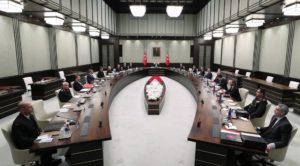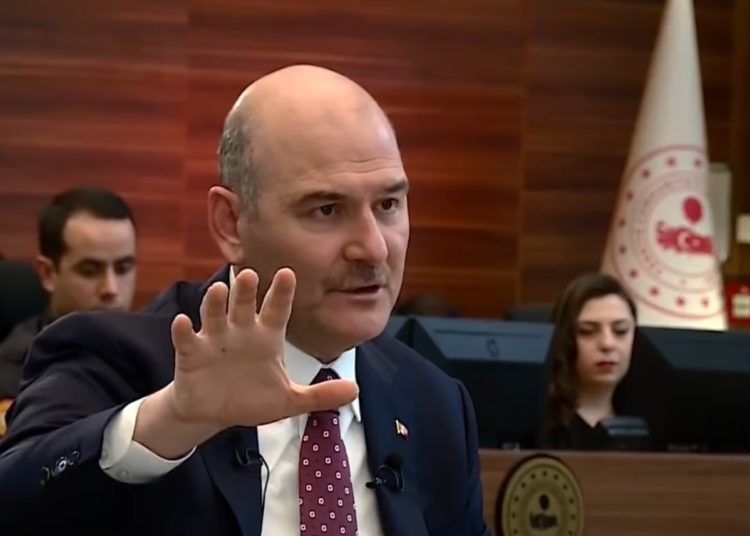Abdullah Bozkurt/Stockholm
Turkey’s top domestic security chief has implied that the West, including the Unites States, is called a major national security threat in a highly confidential policy document dubbed the Red Book, or the “secret constitution” of Turkey.
In an interview on Islamist broadcaster TVNet on March 23, 2022 Interior Minister Süleyman Soylu said the Red Book, officially titled the “National Security Policy Document” (Milli Güvenlik Siyaset Belgesi, or MGSB), was rewritten according to what he described as fundamental values subscribed to by the Turkish nation without any regard for Turkey’s long-time US and European allies.
His remarks came amid a series of anti-Western, specifically anti-American, comments he made during the interview in which he also dared the US to challenge Turkey in Syria and fight with Turkish troops.
“[The book] does not recognize the US or Europe at all. It was penned by the sons and daughters of this country,” Soylu said in response to a question by government propagandist Nedim Şener, who claimed during the interview that Turkey would be attacked by a NATO ally in the future.
Although the Red Book is not a legal document but rather a political and strategic concept paper, in practice it is considered to be a fundamental document in identifying domestic and foreign threats and helps shape policy decisions by government agencies. Since 2014 the government of Recep Tayyip Erdoğan has been using the Red Book to go after its critics, political opponents and dissidents while reformulating its Islamist-based foreign policies as state-sanctioned directives.
Soylu also appears to have agreed with Şener’s assertion that some countries mentioned in the Red Book have never posed a threat to Turkey. That means Russia and Iran, two countries which were designated as hostile nations attempting to undermine national security in past versions of the document, most likely no longer occupy places on the priority threat list.
Disclosure of the Red Book, classified at the highest level of secrecy in Turkey, is a crime punishable by prison. Perhaps that’s why Soylu was not forthcoming with full details of the new threat assessments made to the book but rather suggested how it was formulated in line with the government’s approach to the US and the EU.
Soylu, Turkey’s most anti-US cabinet minister, is one of the few people who have direct influence in drafting revisions to the Red Book. The Interior Ministry, the National Intelligence Organization (MİT) and the General Staff are the three main state institutions that provide input and help revise and formulate the Red Book.
TV interview with Interior Minister Süleyman Soylu:
“I want to express one thing. The West does not like us. We all see that…. Our values are different. Our religion is different,” he said while daring the US to test Turkey’s resolve. He claimed the US wanted to establish what he called a “terrorist state” in northern Syria through the Kurdistan Workers’ Party (PKK) and its Syrian affiliates. “Not just one America, but even if a ‘thousand Americas’ come [to Syria], we won’t allow it,” he vowed.
Asked if Turkey would ultimately clash with US troops in Syria, Soylu said the US could not take the risk of confronting Turkey. “It is necessary to ask the US whether the Americans are ready to take the risk [of clashing with Turkish troops],” he said.
Then he continued bashing the US, Turkey’s NATO ally, stating that “it’s not like wearing a nice suit and saying a few polished words. Come on [Americans]. Put your money where your mouth is. We are here waiting. We’re sticking our neck out [in Syria].”
The Turkish interior minister is known for his far-right views and is endorsed by the Nationalist Movement Party (MHP), a partner and ally to President Erdoğan’s Islamist government. He has often made comments against the US and Europe, bashing Turkey’s NATO allies, in his speeches.
For the first time, his remarks on the Red Book offer important clues on how the structure and institutional framework of policy making in Turkey have been radically changed in the last decade under the Erdoğan government, which has a long list of grievances and problems in its relations with the US and its European allies.

The National Security Council, which revised the Red Book or the “secret constitution” of Turkey, was convened on March 23, 2022 under the Turkish president’s chairmanship.
The Red Book, a top-secret document, is reminiscent of a Cold War-era model in determining Turkey’s national security strategies. It is debated and approved by the National Security Council (MGK), an institution that officially functions as advisory body to the government but in effect works as a shadow government with the military and intelligence services dominating the policies. The parliament has no role in reviewing the document.
In the document, internal and external threats are listed in order of importance. Then, physical and psychological tools and methods to combat these threats are discussed and plans are drawn up. The National and Military Strategic Concept is prepared based on the Red Book. The various branches of government are organized according to this concept, and it is overseen by the National Security Council General Secretariat. It is revised every four to five years.
In past versions of the book, communism was seen as the biggest threat to Turkey after its entry into NATO and throughout the Cold War. In terms of domestic threats, religious and ethnic minorities, Kurdish separatism, religious reactionaryism and nationalism were listed at various times. Under Erdoğan’s rule for the last two decades, nationalism and religious fanaticism were delisted and new threats were added to the list.
Using the Red Book as a justification for illegal and unconstitutional actions, Turkish government agencies profiled unsuspecting citizens based on their ideology, political beliefs or ethnic or religious affiliation. Nordic Monitor previously reported how the MGK secretly drew up plans to fabricate a threat supposedly posed by Christian missionaries to create fear as part of social engineering.
According to the top-secret documents, the legal activities of Christian faith groups such as Catholics, Orthodox and Protestants in Turkey were presented as national security threats to the sustainability and viability of the Turkish state. The document showed that Turkey viewed the European Union as a Christian project and offered nationwide measures for cracking down on Christians in Turkey.
There is no reference to the Red Book in either the Turkish Penal Code (TCK) or the Code on Criminal Procedure (CMK), yet in the last decade Turkish courts have started making references to the book in their rulings to convict government critics.
In 2015 Erdoğan ordered the addition of social media platforms such as Twitter and YouTube as threats in a revised Red Book. His action came following anti-government protests and a major corruption probe that implicated him, his family members and government ministers in 2013.












